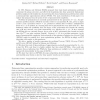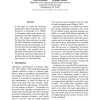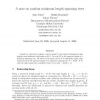82 search results - page 15 / 17 » mst 2006 |
MST
2007
13 years 5 months ago
2007
Consider a collection of r identical asynchronous mobile agents dispersed on an arbitrary anonymous network of size n. The agents all execute the same protocol and move from node ...
MST
2007
13 years 5 months ago
2007
In 1996, Khanna and Motwani [KM96] proposed three logic-based optimization problems constrained by planar structure, and offered the hypothesis that these putatively fundamental ...
MST
2010
13 years 4 months ago
2010
Reductions and completeness notions form the heart of computational complexity theory. Recently non-uniform reductions have been naturally introduced in a variety of settings conc...
EACL
2006
ACL Anthology
13 years 7 months ago
2006
ACL Anthology
In this paper we extend the maximum spanning tree (MST) dependency parsing framework of McDonald et al. (2005c) to incorporate higher-order feature representations and allow depen...
COMBINATORICS
2000
13 years 5 months ago
2000
Consider a connected r-regular n-vertex graph G with random independent edge lengths, each uniformly distributed on [0, 1]. Let mst(G) be the expected length of a minimum spanning...



